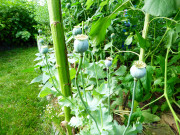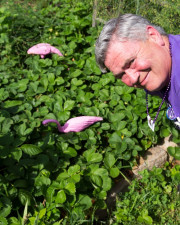Urban Gardener: Glory Days
Saturday, July 26, 2014
Urban gardeners rejoice as their gardens leap and bound into the glory days of summer. Hot long sunny days nourish gardens like no other. For many of us, this is the epitome of garden life. Planning and chance conspire to reward husbandry. The sun and heat loving plants are most at home during the dog days of summer. Now is the time to tend plants, nurture and guide.
Never is there a more convincing season to mulch. I save large brown paper bags to lay upon the soil. My purpose is to foil weeds from sprouting among the crops. Indeed, paper can easily be fashioned as collars around plants. Paper blends into the background. It restrains moisture from evaporating and simultaneously allows rain and moisture to gently percolate through to the soil beneath. Make friends with local landscapers or homeowners who gather grass clippings into paper bags. I’m always happy to see the full bags left at the garden side, sometimes already composting within the bag.
A steady practice of layering paper bags and mulch materials over them saves much labor to the benefit of plant and gardener. Weeds are exiled to the margins and bases of plants. How many neophyte gardeners have given up in frustration as crabgrass, lamb’s quarters, purslane, and other common weeds overtake desired plants? No need to oblige one’s self to a purgatory of weed pulling. Start mulching anytime in the season and don’t give up. Bare soil is least productive. Seeds long dormant in soil sprout into fast growth when given the chance. Guide your garden and work with the natural processes that foster the growth of your choice. Mulches are your ticket to time at the beach and cooler places as they transform into humus.GET THE LATEST BREAKING NEWS HERE -- SIGN UP FOR GOLOCAL FREE DAILY EBLAST
Tomatoes tall? Beans ratcheting up the trellis? Cucumbers clambering over supports? Ah, happiness. Now is the time to be at one with your garden and guide growth. Urban gardeners have space constraints. Grow your garden upwards rather than outwards. Tomatoes are a prime example. A perennial vine in its native habitat, tomatoes benefit in many ways from staking and trellises. They grow very quickly in rich well drained loams. Ever more robust in soils containing large amounts of organic materials, tomatoes are a garden staple. As heirloom tomatoes enlarge their grasp on the home garden market we benefit. The qualities that discourage commercial growing are not as relevant to the home gardener: the ability to withstand long rough transport, to conform to conventional concepts of color, form, and appearance, are less desirable than taste.
Who doesn’t savor a sun warmed tomato right off the vine? Mine thrive gently guided with multiple loops of jute twine wrapped under the leaf junctures and the supports. Rather than fewer single strand fastenings, double up on the biodegradable twine and loop around the plant and support in several places as the plant grows. Just now, the plants are growing so fast this care may seem endless. Persist. Enjoy the wonderful aroma of the bruised tomato foliage.
Be firm but gentle. Some gardeners snip sprouts that emerge from the leaf junctures, others have fine results, if larger plants, if the sprouts are overlooked.
Much is growing and along with growth are annoying predators. Insects, fungus, varmints, are attracted to your garden. Don’t despair. Learn your plant’s enemies habits and needs. Mulching for example, discourages many common infestations. The struggle to penetrate thick mulches is too much for many. Plant marigolds randomly throughout the garden for bits of color. The scent that offends so many insects away from your crops is your friend. Look for disease resistant varieties. Separate plants into sections, the less available to infestation in one spot works in your favor. Combine plants, tomatoes and marigolds are a classic companion planting duo.
Examine your plants mindfully. Look for infestation among the weakest plants. It is a garden axiom that weak malnourished plants succumb to infestation. Plants have natural defenses against their foes. Assist, sometimes as simply picking off beetles and bugs, and dropping them into a container with a small amount of vegetable oil. Once full of disabled beetles and bugs, pull back the mulch and pour out. Don’t handle stinging insects. Give them plenty of room as you move gently through the plants.
Good results are easy to achieve using non- toxic methods. If you must spray with chemicals, they are poisonous to soil organisms as well as the gardener. Don’t be a casualty or create a desert and call it peace. Read the directions and act accordingly.
Have a Heart traps capture squirrels, opossums, the occasional rat, sometimes birds, and on happiest days, wood chucks. Urban gardeners are not exempt from these garden horrors. Capture and release elsewhere and avoid cruelty. Rabbits avoid dried blood, a nitrogen rich fertilizer commonly sold in garden centers and supply houses. Sprinkle around their favorite foods. Human hair is a little creepy in the garden but the looks on hair stylists faces are worth the price of admission. Bags of it are thrown out from barbershops every day. Almost 100% nitrogen, hair offends many animals. It is slow to decay although it blends into mulches.
Mix up your own sprays: steep any tobacco product in dish detergent water and include cinnamon sticks and whole hot peppers. Strain out nozzle clogging particles and spray on infested areas or those plants that look like the next stop for bugs. Repeat. This is a spray that kills or repels most insects and breaks down into harmless nutrients. It’s also the cheapskate approach to gardening that works.
While it’s so hot, slow down. Breathe deep. Enjoy your garden on the shoulders of the day, in the morning and late afternoon. Plant fragrant plants such as basil, lemon verbena, the mints, and flowers for their gentle fragrance. The garden is a peaceful haven for all. Create an Eden for one and all. Birds will visit the most simple of water features, the bird bath. Keep it clean and fill it. With a little luck and technique, your urban garden will rise and shine to give glory to all.
Leonard Moorehead is a life-long gardener. He practices organic-bio/dynamic gardening techniques in a side lot surrounded by city neighborhoods in Providence RI. His adventures in composting, wood chips, manure, seaweed, hay and enormous amounts of leaves are minor distractions to the joy of cultivating the soil with flowers, herbs, vegetables, berries, and dwarf fruit trees.
Related Articles
- Urban Gardener: March Lions Prowl
- Urban Gardener: Forsythias Advance on Spring
- Urban Gardener: Not Pot but Potatoes
- Leonard Moorehead, The Urban Gardener: Harvesting Green Beans + Sunflowers
- The Urban Gardener: Late-Summer Peach + Pear Trees
- Cleverhood Makes Rain Gear for the Urban
- The Urban Gardener: Time To Harvest, Time To Plan
- The Urban Gardener: Growing Herbs For The Kitchen + Heart
- Urban Gardener: Cold Frames Save the Day
- The Urban Gardener: Cheerful Daffodils
- The Urban Gardener: Rise and Shine
- Leonard Moorehead, The Urban Gardener: Peerless Pears
- Urban Gardener: Container Gardens
- The Urban Gardener: Strawberries and Chives for All
- Leonard Moorehead, The Urban Gardener: Oasis of Peace
- Urban Gardener: Summer Solstice Celebration
- Urban Gardener: Raspberry Razzle Dazzle
- Urban Gardener: Presto, it’s Pesto!
- Urban Gardener: Small Fruits, Big Rewards
- Urban Gardener: Volunteers, Step Forward
- Urban Gardener: Summer Transplants Take Root
- Leonard Moorehead, The Urban Gardener: Spring Poised on the Equinox
- Urban Gardener: Please Plant Peas
- Urban Gardener: Lettuce Among Us
- Urban Gardener: Paradise Survives Snowstorms!
- Leonard Moorehead, The Urban Gardener: Seeds in the Snowbed
- Urban Gardener: Bamboo Bamboozle Blizzards
- Urban Gardener: Compost Complexities
- Leonard Moorehead, TheUrban Gardener: Snow is Good for Gardens



_180_135_90.JPG)


